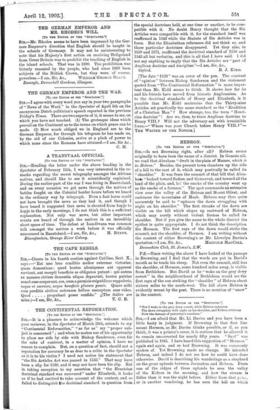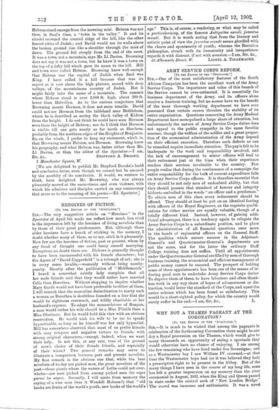[To THE EDITOR OP THE " SPECTATOR." J
"For I wake in the grey dewy covert, while Hebron upheaves The dawn struggling with night on his shoulder, and Kidron retrieves Slow the damage of yesterday's sunshine."
am afraid that Mr. LI. Davies and you have been a little hasty in judgment. If Browning in that first line meant Hermon, as Mr. Davies thinks possible, or if, as you think, it was a printer's error, it is curious that he allowed it to remain uncorrected for nearly fifty years. " Saul" was published in 1845. I have heard this suggestion of " Hermon " again and again, and so had Browning. It was commonly spoken of. Yet Browning made no change. He intended Hebron, and indeed I do not see how he could have done otherwise. David is describing his wanderings as a shepherd on the great uplands between Jerusalem and Hebron. From one of the ridges of these uplands he sees the valley of the Kidron in the morning, and how the stream is fuller than it was the night before. Either from that poiui, or in another wandering, he has seen the hill on whi4.1
Hebron stood emerge from the morning mist. Hebron was not then, in Saul's time, a " town in the valley." It and its
citadel crowned the crested ridge of the hill, like the other fenced cities of Judah ; and David would see its walls above the broken ground rise like a shoulder through the mist of dawn. The ground fell steeply from the end of the crest. It was a town, not a mountain, says Mr. Ll. Davies. Browning does not say it was not a town, but he knew it was a town on the top of a lofty hill which gave its name to the bill. Hill and town were called Hebron. Browning knew well enough that Hebron was the capital of Judah when Saul was King. I have called it a hill because that was its aspect an it rose above the high plateau, scored with deep valleys, of the mountainous country of Judah. But it might fairly take the name of a mountain. The summit where Hebron stood is over 3,000 ft. high, about 200 ft. lower than Helvellyn. As to the curious conjecture that Browning meant Hermon, it does not seem tenable. David could not see Hermon from the tableland near Bethlehem, where be is described as seeing the black valley of Kidron from the height. I do not think he could have seen Hermon even from the height of Hebron ; nor do I think that Hermon is visible till one gets nearly as far north as Shechem, probably from the northern edges of the Heights of Benjamin. So, on the whole, I prefer to keep my statement, which is, that Browning meant Hebron, not Hermon. Browning knew his geography, and what Hebron was, better either than Mr. Ll. Davies, or than the editor of the Spectat or.---I am, [We are delighted to publish Mr. Stopford Brooke's lucid and conclusive letter, even though we cannot but be amused by the acerbity of its conclusion. It would, we venture to think, have delighted Mr. Browning, who was always pleasantly moved at the earnestness, and even violence, with which his admirers and disciples carried on any controversy that arose as to the meaning of his poems.—Ed. Spectator.]











































 Previous page
Previous page